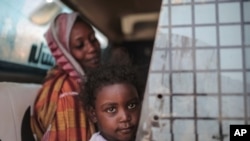Millions of children in Sudan go to work each day instead of to school, in part because of widespread poverty, and in part because the education system does not have the resources to accommodate them.
Fifteen-year-old Murtada al-Haj left school three years ago to earn a living to support his family.
Murtada lives with his parents in Khartoum, and makes under $4 per day. The situation hampers his dream to become a doctor.
"My mother kept telling me, in the future and when our life gets better, and not get worse I’ll study and become a doctor, but all of a sudden the whole [political] situation occurred in Sudan,” he said.
Sudan is ranked as one of the poorest countries in the world. Soaring prices sparked mass protests that led to the ouster of President Omar al-Bashir last year.
The political situation has stabilized, but the economy is still struggling.
In Khartoum, it’s common to see children working as traders, carpenters, blacksmiths, and at other jobs. Most earn $1 to $1.50 per day.
For Murtada and thousands of children his age or younger, they have to choose whether to study or to feed their families.
The children in the area can’t afford continuing in school as the economic condition is very difficult. The children's fathers bring them to us to find them daily work to help them as life is really hard; it’s rare that one of the children continues in this work, but Murtada did as he lives around the area and his life is hard,” said workshop owner Hamza.
Sudanese officials have signed international agreements to provide free education and outlaw child labor, but have not followed through on any of the accords.
"Poverty has a big impact in Sudan to the extent that it is not forbidding children labor, although the law is verified and frankly bans child labor up to the age of 18. The controlling poverty is a serious issue,” said children’s rights observer Siddiga Kibeida.
More than three million school age children in Sudan are missing out on their education, according to a study carried out by the Ministry of Education and UNICEF.
The education minister acknowledges that almost half of all children Murtada’s age have no chance to attend school.
"The country didn't uphold children’s rights. It built a system to only ingest 60 percent of the children, 40 percent of this age class have no opportunity to get an education ... and this is the main reason that 3 million children are missing out on an education, according to the UNICEF report,” said the Minister of Education Mohamed el-Amin.
With a new government in charge, Murtada hopes that the education system can change and he can pursue his dreams of getting a good education.
